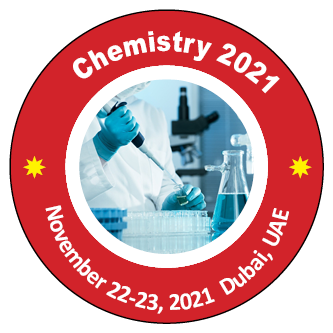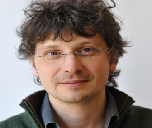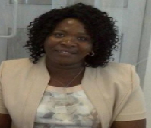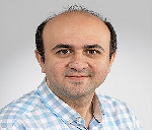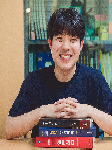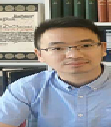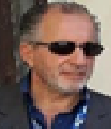Renowned Speakers
We’ve invited the top most influential speakers from around the world to give inspirational talks and lead practical workshops.
Conference Information
Past Conference Report
With a great support from our Collaborators and Organizing Committee, PULSUS Conferences successfully completed the “2nd Global Expert Meeting on Chemistry and Medicinal Chemistry” which was held at Tokyo, Japan on September 16-17, 2020.
We would like to thank our Organizing Committee Members comprising-
Moinuddin Sarker- CEO, Waste Technologies LLC, USA
Robert Buckingham- CEO at Robert L. Buckingham,MD, Inc, USA
Lourdes Cristina Lucena Agostinho Jamshidi- Executive Director at R & C Jam Catalyst, Brazil
SHIN AOKI- Tokyo University of Science, Japan
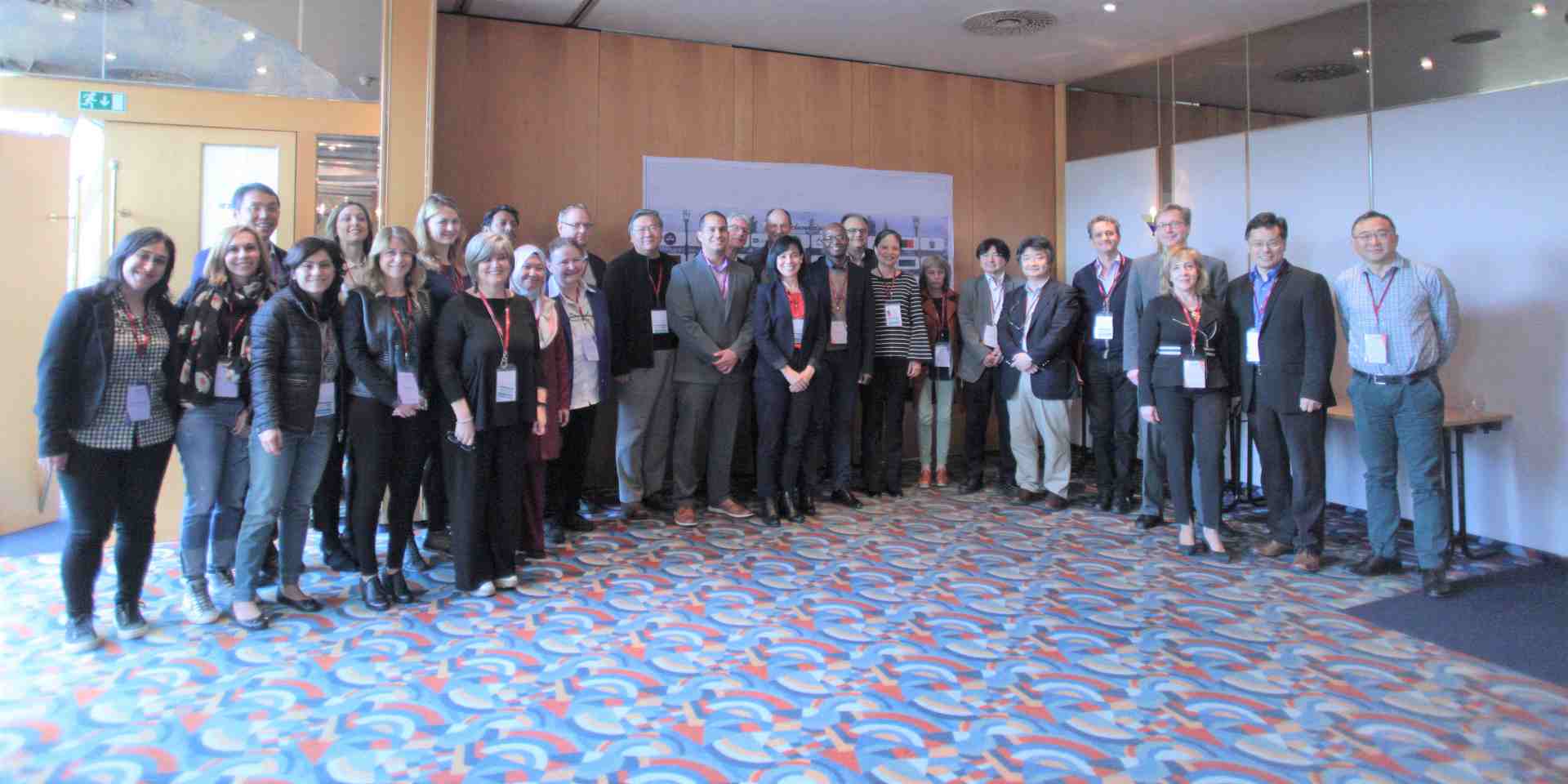
We would like to extend our thanks to our collaborators for their constant support. It wouldn’t have been possible without the support of our Media Partners who helped us in promoting this event. We thank our Media partners for their support in helping us reach greater audience.
We also would like to thank all our Speakers, Poster Presenters and Delegates for taking out your time and sharing their research work with our peer network. We are very glad to have shared a great relationship with all these Attendees, associations and we hope to see even greater support in our upcoming events.
With a great response and feedback which we received at this event Pulsus Conferences is proud to announce our upcoming conferences in the area of Infection.
Let’s meet @ Chemistry_2021
Welcome Message
Dear Colleagues and Friends,
It is a great honor to have the opportunity to invite Chemistry Experts and Researchers, Academicians, Scientists, Industry Professionals and students and other affiliated individuals to the 2021 3rd Global Experts Meeting on Chemistry and Medicinal Chemistry to be held in November 22-23, 2021 at Dubai, UAE.
Our commitment to discuss the latest chemical and medical research and scientific innovations with one another will truly embody this years theme, Current Advancements in Chemistry and its Applications in Medicinal Chemistry.
By sharing research, participating in forums and collaborating with one another, your work will continue to impact many lives and truly benefit the scientific community. It is an impeccable stage in which experts and newcomers can learn and share the data simply to trade cutting-edge developments in approach and thoughts, and also lay out exciting avenues for synergistic research.
I wholeheartedly welcome you to share your knowledge, experience and creative idea in this conference through interacting with worldwide experts from the field of Chemistry and Medicinal Chemistry.
Keynote presentations, seminars, lectures, technical oral presentations, and poster presentations are part of the meeting.
We would like to express our warmest welcome on behalf of the Organizing Committee for Chemistry 2021 to all of you who are interested in Chemistry 2021, and we hope you will enjoy your stay in Dubai.
In Dubai, we look forward to seeing you.
Regards
Chemistry_2021 | Committee Members
About Conference
Pulsus conferences takes pride to announce the 3rd Global Experts Meeting on Chemistry and Medicinal Chemistry on November 22-23, 2021 at Dubai, UAE.
A Gathering of experts to determine the Role of Chemistry and Medicinal Chemistry in the Global Challenges to come, our speakers and participants avail chances to learn and share their knowledge among their global peers.
Attendees can:
Exploit chances to absorb more knowledge about Chemistry & Medicinal Chemistry from the assortments of Oral, Poster& Video presentations by Professionals of Chemistry.
Encounter and network with chemists ranging from students to Deans, Faculties, and Researchers.
Exploit chances to work together with chemists all over the world.
Join prominent plenary sessions about relevant issues affecting chemistry and related science.
Benefits of Participation at Chemistry 2021:
Accepted Abstracts will be published in Conference Proceedings book as well as in Journal of Pharmaceutical Chemistry & Chemical Science provided with unique DOI number.
Global networking with the experts.
Participation Certification by IOCM.
Conference Participation Opportunities
For Researchers and Faculty Members:
Speaker Presentations
Poster Display
Symposium Hosting (4-5 Members Team)
Workshop organizing
Who Should Attend?
Chemists
Chemistry Associations
Medicinal Chemists & Clinicians
Healthcare Scientists and Professors
Health Care Researchers
Doctors
Professors & Associates
Deans & Senior Lecturers
Faculty of Chemistry
Speakers can go through the below Mode of Participations:
Oral presentation:
Oral sessions consist of a series of individual talks. The time allocated to each Oral presentation is 20 minutes followed by 3 minutes of questionnaire.
Poster presentation:
A poster presentation allows you to interact face to face with the people who are interested in your research. Posters should be no larger than A0.
Workshop presentation:
Workshop lectures are engaging talks based on skills that can last up to 60 minutes. Workshops must be engaging and include practical information that can be brought back to their communities by participants.
Virtual presentation:
If you are unable to attend the conference, but still wish to have your paper presented and published, we offer on-line presentation. Your presentation will be uploaded on the conference website prior to the conference. You are still required to submit an abstract and one author must pay the registration fee. At the end of the conference, you will receive a certificate of presentation and the digital book of abstracts.
Sessions / Tracks
Sessions:
Session on Medicinal Chemistry:
Medicinal compounds are microbial in nature and are categorized into biologics and tiny organic molecules. In certain cases, the use of inorganic and organometallic compounds as medications is also helpful. Medicinal chemistry's most common practice seeks to discover and create new therapeutic agents by involving synthetic organic chemistry and computational chemistry in a near combination with chemical biology, enzymology, and structural biology. For drug discovery, interdisciplinary collaboration is required at the interface between chemistry, biology and medicine. Medicinal chemistry is both a science and an art discipline. The former gives humanity its best hopes for enhancing the quality of life and the latter also threatens its researchers with the need to explore new drugs with both intuition and experience.
Related: Chemistry Conference | Chemistry Congress | Medicinal Chemistry Meetings
Related Conferences: 3rd International Conference and Exhibition on Polymer Chemistry and Materials Engineering | Singapore, November 21-22, 2019; 9th World Congress on Green Chemistry and Green Energy | Rome, Italy February 28-29, 2020; International Conference on Clinical Chemistry and Laboratory Medicine | Amsterdam, Netherlands March 25-26, 2020; 10th Annual Congress on Medicinal Chemistry and Drug Design | Amsterdam, Netherlands March 25-26, 2020; 2nd Global Expert Meeting on Chemistry & Medicinal Chemistry | Tokyo, Japan April 22-23, 2020
Session on Drug Discovery, Drug Design & Drug Development:
An significant aspect of drug design is to consider the key component of the therapeutic benefit in the natural product. The important function of medicinal chemistry is to create a medication with therapeutic benefits. Medicinal chemistry is the method of historically altering a chemical molecule of therapeutic benefit to interfere in a disease. Identification of a possible chemical molecule, modification of its chemical structure, laboratory synthesis of the organic molecule and testing of its properties and biological activities are all part of the process. Medicinal chemistry powers the pharmaceutical industry's market. The primary goal of drug design at present is to design a drug for a known target and to create a molecule by thoroughly recognizing the successful therapeutic potential concept, which is then approved by the Food and Drug Administration (FDA).
Related: Medicinal Chemistry Conferences | Chemistry Meetings | Drug Discovery Congress
Related Conferences: 3rd International Conference and Exhibition on Polymer Chemistry and Materials Engineering | Singapore, November 21-22, 2019; 9th World Congress on Green Chemistry and Green Energy | Rome, Italy February 28-29, 2020; International Conference on Clinical Chemistry and Laboratory Medicine | Amsterdam, Netherlands March 25-26, 2020; 10th Annual Congress on Medicinal Chemistry and Drug Design | Amsterdam, Netherlands March 25-26, 2020; 2nd Global Expert Meeting on Chemistry & Medicinal Chemistry | Tokyo, Japan April 22-23, 2020
Session on Biochemistry & Chemical Biology:
The discipline that focuses on the mechanisms by which cells store, integrate, and act on information to generate and propagate living organisms is Molecular Biology and Biochemistry. Chemical Biology deals with chemistry applied to biology. It focuses in particular on fields such as cell biology, genetics, epigenetics, genomics, molecular biology, biochemistry, biophysics, structural biology, and computer modeling. Both are areas in which biologists and chemists are brought together because they are concerned with cell life and composition. The primary concerns of the biochemist are the broad and complex range of chemical reactions occurring in living matter and the chemical composition of the cell.
Related: Biochemistry Conferences | Chemical Biology Congress | Biochemistry Meetings
Related Conferences: 3rd International Conference and Exhibition on Polymer Chemistry and Materials Engineering | Singapore, November 21-22, 2019; 9th World Congress on Green Chemistry and Green Energy | Rome, Italy February 28-29, 2020; International Conference on Clinical Chemistry and Laboratory Medicine | Amsterdam, Netherlands March 25-26, 2020; 10th Annual Congress on Medicinal Chemistry and Drug Design | Amsterdam, Netherlands March 25-26, 2020; 2nd Global Expert Meeting on Chemistry & Medicinal Chemistry | Tokyo, Japan April 22-23, 2020
Session on Pharmaceutical Chemistry:
Pharmaceutical chemistry is the field that focuses on the quality aspects of medicines and seeks to ensure fitness for the purposes of medicinal products. It is the study of drugs and also includes the development of drugs in different stages, such as drug discovery, distribution, absorption, metabolism, and more. In a laboratory which has elements of medical research, pharmacology, pharmacokinetics, and pharmacodynamics, pharmaceutical chemistry typically has its task. The growth of this field will allow us to contribute to life-saving remedies and increase the pace of new drug delivery. Pharmacokinetics, pharmacodynamics and drug metabolism are the other branches of research that are essential for understanding the impact that drugs have on the body.
Related: Pharmaceutical Chemistry Conference | Pharma Chemistry Congress | Medicinal Chemistry Conferences
Related Conferences: 3rd International Conference and Exhibition on Polymer Chemistry and Materials Engineering | Singapore, November 21-22, 2019; 9th World Congress on Green Chemistry and Green Energy | Rome, Italy February 28-29, 2020; International Conference on Clinical Chemistry and Laboratory Medicine | Amsterdam, Netherlands March 25-26, 2020; 10th Annual Congress on Medicinal Chemistry and Drug Design | Amsterdam, Netherlands March 25-26, 2020; 2nd Global Expert Meeting on Chemistry & Medicinal Chemistry | Tokyo, Japan April 22-23, 2020
Session on Forensic & Clinical Chemistry:
Pharmaceutical chemistry is the field that focuses on the quality aspects of medicines and seeks to ensure fitness for the purposes of medicinal products. It is the study of drugs and also includes the development of drugs in different stages, such as drug discovery, distribution, absorption, metabolism, and more. In a laboratory which has elements of medical research, pharmacology, pharmacokinetics, and pharmacodynamics, pharmaceutical chemistry typically has its task. The growth of this field will allow us to contribute to life-saving remedies and increase the pace of new drug delivery. Pharmacokinetics, pharmacodynamics and drug metabolism are the other branches of research that are essential for understanding the impact that drugs have on the body. Forensic chemistry professionals use a broad variety of techniques and equipment such as Fourier transform infrared spectroscopy, thin layer chromatography, gas chromatography-mass spectrometry, high-performance liquid chromatography and atomic absorption spectroscopy to distinguish products in a criminal scene. Forensic chemists tend to use non-destructive methods first to protect evidence and determine which destructive methods can achieve the best results. Forensic chemists, who have been proposed by numerous organizations and regulatory bodies, including the Scientific Working Group on the Study of Confiscated Drugs, follow a set of guidelines. In order to ensure the authenticity of what they write, forensic chemists regularly review and verify their instruments.
Related: Clinical Chemistry Congress | Clinical Chemistry Conferences | Chemistry Workshops
Related Conferences: 3rd International Conference and Exhibition on Polymer Chemistry and Materials Engineering | Singapore, November 21-22, 2019; 9th World Congress on Green Chemistry and Green Energy | Rome, Italy February 28-29, 2020; International Conference on Clinical Chemistry and Laboratory Medicine | Amsterdam, Netherlands March 25-26, 2020; 10th Annual Congress on Medicinal Chemistry and Drug Design | Amsterdam, Netherlands March 25-26, 2020; 2nd Global Expert Meeting on Chemistry & Medicinal Chemistry | Tokyo, Japan April 22-23, 2020
Session on Neuroscience and Neurochemistry:
Neurochemistry is the study of neurochemicals generated by and which modulate the nervous system. Neuroscience is a multidisciplinary science dealing with the study of the structure and function of the nervous system. Neurochemicals are oxytocin, serotonin, dopamine and other neurotransmitters and neurotransmitter-regulating substances. It relates to the chemical processes in the brain and nervous system that occur. It is the chemistry that takes place in the human brain and nerve cells that allows us to transmit signals. Neurochemistry is the burgeoning research discipline that leads to our understanding of biochemical, cellular and medicinal neurobiology. It deals with the role of nervous system-building chemicals, examines the health and disease roles of neurons and glial cells, shows how degenerative mechanisms are at work in the nervous system, and discovers aspects of cell metabolism and neurotransmission.
Related: Neurochemistry Conferences | Chemistry Exhibitions| Chemistry Meetings
Related Conferences: 3rd International Conference and Exhibition on Polymer Chemistry and Materials Engineering | Singapore, November 21-22, 2019; 9th World Congress on Green Chemistry and Green Energy | Rome, Italy February 28-29, 2020; International Conference on Clinical Chemistry and Laboratory Medicine | Amsterdam, Netherlands March 25-26, 2020; 10th Annual Congress on Medicinal Chemistry and Drug Design | Amsterdam, Netherlands March 25-26, 2020; 2nd Global Expert Meeting on Chemistry & Medicinal Chemistry | Tokyo, Japan April 22-23, 2020
Session on Organic & Bio-organic Chemistry:
The scientific study focuses on carbon compounds and other carbon-based compounds such as hydrocarbons and their derivatives in the discipline of Organic Chemistry. Bioorganic chemistry is a rapidly expanding scientific discipline that incorporates organic chemistry and biochemistry. Organic or inorganic chemistry is the scientific study of the composition, structure, properties, preparation and the reactions involved. Stereochemistry, isomerization, photochemistry, hydrogenation, polymerization, and fermentation are said to be covered by organic chemistry.
Related: Organic Chemistry Congress | Bioorganic Chemistry Meetings | Chemistry Summit
Related Conferences: 3rd International Conference and Exhibition on Polymer Chemistry and Materials Engineering | Singapore, November 21-22, 2019; 9th World Congress on Green Chemistry and Green Energy | Rome, Italy February 28-29, 2020; International Conference on Clinical Chemistry and Laboratory Medicine | Amsterdam, Netherlands March 25-26, 2020; 10th Annual Congress on Medicinal Chemistry and Drug Design | Amsterdam, Netherlands March 25-26, 2020; 2nd Global Expert Meeting on Chemistry & Medicinal Chemistry | Tokyo, Japan April 22-23, 2020
Session on Inorganic Chemistry:
Crystallography, atomic structure, electrochemistry, ceramics, chemical bonding, compound coordination and acid base reactions are covered by inorganic chemistry. Inorganic chemistry has been found to be the only discipline within chemistry that explicitly discusses the variations between all the various forms of atoms. In Medicinal Inorganic Chemistry, which studies the significant and non-significant elements that can be used in the treatment and diagnosis of diseases, this feature of inorganic chemistry is added.
Related: Inorganic Chemistry Conferences | Chemistry Gatherings | Inorganic Chemistry Congress
Related Conferences: 3rd International Conference and Exhibition on Polymer Chemistry and Materials Engineering | Singapore, November 21-22, 2019; 9th World Congress on Green Chemistry and Green Energy | Rome, Italy February 28-29, 2020; International Conference on Clinical Chemistry and Laboratory Medicine | Amsterdam, Netherlands March 25-26, 2020; 10th Annual Congress on Medicinal Chemistry and Drug Design | Amsterdam, Netherlands March 25-26, 2020; 2nd Global Expert Meeting on Chemistry & Medicinal Chemistry | Tokyo, Japan April 22-23, 2020
Session on Physical Chemistry & Theoretical Chemistry:
Advanced topics in physical chemistry consist of various spectroscopic techniques, including ultrafast and mass spectroscopy, nuclear magnetic and electron paramagnetic resonance, absorption of x-rays and microscopy of atomic force, as well as theoretical and analytical methods. Physical chemistry fills the void between the theories and techniques of contemporary physics and chemical processes. Physical and theoretical chemists work by using sophisticated characterization and statistical methods to unravel the phenomena that control all aspects of the physical world. Advanced characterization methods are applied to a wide range of subjects: electric vehicle energy storage materials, biologically related proteins to explain degenerative diseases, photo-induced molecular transformations, and physical chemists' diverse surface properties. Theoretical chemists work to develop quantum chemistry in order to enhance our understanding of all facets of chemistry, right down to the essence of chemical bonding.
Related: Physical Chemistry Conferences | Theoretical Chemistry Congress | Chemistry Meetings
Related Conferences: 3rd International Conference and Exhibition on Polymer Chemistry and Materials Engineering | Singapore, November 21-22, 2019; 9th World Congress on Green Chemistry and Green Energy | Rome, Italy February 28-29, 2020; International Conference on Clinical Chemistry and Laboratory Medicine | Amsterdam, Netherlands March 25-26, 2020; 10th Annual Congress on Medicinal Chemistry and Drug Design | Amsterdam, Netherlands March 25-26, 2020; 2nd Global Expert Meeting on Chemistry & Medicinal Chemistry | Tokyo, Japan April 22-23, 2020
Session on Mass Spectroscopy & Chromatography:
Mass Spectroscopy is the analytical technique that calculates ions' mass-to-charge ratio. Mass spectrometry used in the clinical laboratory focused on abuse confirmations of medications, screening of newborns, and study of steroids. Mass spectrometry is based on almost all fields of laboratory medicine. Chromatography is another laboratory method used for separation when a mixture is used. Using chromatography, vast amounts of pure chemicals used to produce drugs are prepared.
Related: Mass Spectrometry Congress | Spectroscopy Conferences | Chromatography Meetings
Related Conferences: 3rd International Conference and Exhibition on Polymer Chemistry and Materials Engineering | Singapore, November 21-22, 2019; 9th World Congress on Green Chemistry and Green Energy | Rome, Italy February 28-29, 2020; International Conference on Clinical Chemistry and Laboratory Medicine | Amsterdam, Netherlands March 25-26, 2020; 10th Annual Congress on Medicinal Chemistry and Drug Design | Amsterdam, Netherlands March 25-26, 2020; 2nd Global Expert Meeting on Chemistry & Medicinal Chemistry | Tokyo, Japan April 22-23, 2020
Session on Nanoscience & Material Chemistry:
Nanoscience is the evolving science of objects which are intermediate in size between a few nanometers and less than 100 nanometers, which can be produced by current photolithography. Colloids, polymer molecules, buckytubes, silicon nanorods, compound semiconductor quantum dots and micelles form especially important groups of nanostructures in chemistry. Not so long ago, chemists realized that chemistry already plays a leading role in nanotechnology and that it is the ultimate nanotechnology. By chemical synthesis with remarkable economy and protection, by joining atoms and groups of atoms together with bonds, new types of matter are produced. While initial interest in nanotechnology was gained by nanoelectronics, the first new and potentially commercial technologies to emerge from innovative nanoscience seem in fact, to be developed from chemical processes in material science. Contributing to the invention and development of materials whose properties depend on the nanoscale structure is
Related: Nanoscience Conferences | Nanochemistry Meetings | Nanochemistry Conference
Related Conferences: 3rd International Conference and Exhibition on Polymer Chemistry and Materials Engineering | Singapore, November 21-22, 2019; 9th World Congress on Green Chemistry and Green Energy | Rome, Italy February 28-29, 2020; International Conference on Clinical Chemistry and Laboratory Medicine | Amsterdam, Netherlands March 25-26, 2020; 10th Annual Congress on Medicinal Chemistry and Drug Design | Amsterdam, Netherlands March 25-26, 2020; 2nd Global Expert Meeting on Chemistry & Medicinal Chemistry | Tokyo, Japan April 22-23, 2020
Session on Analytical and Bio analytical Chemistry:
The most vibrant and cutting-edge field that receives large research attention is bioanalysis, among the diverse fields of analytical and bioanalytical chemistry. In Analytical & Bio analytical Chemistry, the modern fields are instrumental developments for analytical proteomics, imaging, miniaturized system growth, sensors, chemometrics and methods of sampling. The use of bioanalytical techniques to generate new developments in the biomedical field is solving problems in the pharmaceutical industry.
Related: Analytical Chemistry Congress | Bioanalytical Chemistry Congress | Chemistry Conference
Related Conferences: 3rd International Conference and Exhibition on Polymer Chemistry and Materials Engineering | Singapore, November 21-22, 2019; 9th World Congress on Green Chemistry and Green Energy | Rome, Italy February 28-29, 2020; International Conference on Clinical Chemistry and Laboratory Medicine | Amsterdam, Netherlands March 25-26, 2020; 10th Annual Congress on Medicinal Chemistry and Drug Design | Amsterdam, Netherlands March 25-26, 2020; 2nd Global Expert Meeting on Chemistry & Medicinal Chemistry | Tokyo, Japan April 22-23, 2020
Session on Environmental & Green Chemistry:
Areas such as aquatic photochemistry, atmospheric particles, reactive surfaces, analytical methods, sustainable feedstocks, new green chemistry curriculum creation and outreach materials are of major importance. By undertaking groundbreaking studies, several environmental institutions work together to identify solutions to the most urgent environmental issues on Earth. Chemical products and processes that minimize or eliminate the use of hazardous substances are designed to eliminate emissions and improve quality, save money and energy, and achieve sustainable chemical and chemical production.
Related: Enviromental Chemistry Conferences | Green Chemistry Congress | Green Energy Conferences
Related Conferences: 3rd International Conference and Exhibition on Polymer Chemistry and Materials Engineering | Singapore, November 21-22, 2019; 9th World Congress on Green Chemistry and Green Energy | Rome, Italy February 28-29, 2020; International Conference on Clinical Chemistry and Laboratory Medicine | Amsterdam, Netherlands March 25-26, 2020; 10th Annual Congress on Medicinal Chemistry and Drug Design | Amsterdam, Netherlands March 25-26, 2020; 2nd Global Expert Meeting on Chemistry & Medicinal Chemistry | Tokyo, Japan April 22-23, 2020
Session on Food Chemistry & Agricultural Chemistry:
Agricultural and food chemistry is the discipline that takes care of the important task of expanding the food supply of the country. The two categories that form this department are fundamental science and applied research and development. Basic research understands the biological and chemical processes by which crops and livestock evolve. The knowledge acquired from basic research is used by applied research to discover ways to improve the efficiency, quantity, and protection of agricultural products. Agricultural and food chemists dive into all aspects of crop and animal production, food protection, quality, nutrition, manufacturing, packaging and use of materials, all of which relate to their shared objective of providing adequate nutritious food and feed to sustainably support the population while being responsible for our environment and ecosystem.
Related: Food Chemistry Conferences | Agricultural Chemistry Conferences | Chemistry Congress
Related Conferences: 3rd International Conference and Exhibition on Polymer Chemistry and Materials Engineering | Singapore, November 21-22, 2019; 9th World Congress on Green Chemistry and Green Energy | Rome, Italy February 28-29, 2020; International Conference on Clinical Chemistry and Laboratory Medicine | Amsterdam, Netherlands March 25-26, 2020; 10th Annual Congress on Medicinal Chemistry and Drug Design | Amsterdam, Netherlands March 25-26, 2020; 2nd Global Expert Meeting on Chemistry & Medicinal Chemistry | Tokyo, Japan April 22-23, 2020
Session on Oil and Petroleum Chemistry:
The Petrochemistry Division is one of the world's six core industries and plays a major role in shaping decision-making for all the other important parts of the economy. Petroleum focuses on how to turn crude oil and natural gas into raw materials and other useful goods. For a multitude of chemical products, including pharmaceuticals, solvents, fertilizers, plastics, tints, surfactants, oils, and many others, it is the primary material. Therefore, petroleum is considered by many nations as an integral part of other industries and is vital. While the movement towards renewable and sustainable energy is building, it is still regarded as the global powerhouse. The petrochemical industry has accepted the challenge of sustainability and has made major improvements in production quality while gradually reducing its energy input. Petrochemistry contributes a considerable amount to the national GDP.
Related: Petroleum Chemistry Conferences | Petroleum Chemistry Meetings | Chemistry Workshops
Related Conferences: 3rd International Conference and Exhibition on Polymer Chemistry and Materials Engineering | Singapore, November 21-22, 2019; 9th World Congress on Green Chemistry and Green Energy | Rome, Italy February 28-29, 2020; International Conference on Clinical Chemistry and Laboratory Medicine | Amsterdam, Netherlands March 25-26, 2020; 10th Annual Congress on Medicinal Chemistry and Drug Design | Amsterdam, Netherlands March 25-26, 2020; 2nd Global Expert Meeting on Chemistry & Medicinal Chemistry | Tokyo, Japan April 22-23, 2020
Session on Nuclear Chemistry:
Nuclear Chemistry is the sub-field of chemistry concerned with radioactivity, nuclear processes and properties. The most significant field of nuclear chemistry is the conduct of artifacts and materials after being put into a nuclear waste storage or disposal site. The use of radioactive tracers in manufacturing, radiotherapy in medical applications, research and the environment and the use of radiation to alter materials such as polymers are protected by nuclear chemistry.
Related: Nuclear Chemistry Conferences | Chemistry Congress | Chemistry Meetings
Related Conferences: 3rd International Conference and Exhibition on Polymer Chemistry and Materials Engineering | Singapore, November 21-22, 2019; 9th World Congress on Green Chemistry and Green Energy | Rome, Italy February 28-29, 2020; International Conference on Clinical Chemistry and Laboratory Medicine | Amsterdam, Netherlands March 25-26, 2020; 10th Annual Congress on Medicinal Chemistry and Drug Design | Amsterdam, Netherlands March 25-26, 2020; 2nd Global Expert Meeting on Chemistry & Medicinal Chemistry | Tokyo, Japan April 22-23, 2020
Session on Polymer Chemistry:
The Polymer Chemistry sub-discipline of chemistry is the study of the synthesis, characterization and properties of polymer molecules or macromolecules. Other chemistry sub-disciplines, such as analytical chemistry, organic chemistry, and physical chemistry, have the same polymer chemistry principles and methods used. The wider areas of polymer chemistry can include polymer science or nanotechnology. Polymers can be subdivided into biopolymers and synthetic polymers according to their origins. Biopolymers are the structural and functional materials that compose much of the organic matter in organisms. Synthetic polymers are the structural materials shown in plastics, synthetic fibers, mechanical components, paint, construction materials, furniture, and adhesives. They can be further classified into thermoplastic polymers and plastics for thermosets. They derive almost all synthetic polymers from petrochemicals.
Related: Polymer Chemistry Conferences | Polymer Science Congress | Synethic Chemistry Conferences
Related Conferences: 3rd International Conference and Exhibition on Polymer Chemistry and Materials Engineering | Singapore, November 21-22, 2019; 9th World Congress on Green Chemistry and Green Energy | Rome, Italy February 28-29, 2020; International Conference on Clinical Chemistry and Laboratory Medicine | Amsterdam, Netherlands March 25-26, 2020; 10th Annual Congress on Medicinal Chemistry and Drug Design | Amsterdam, Netherlands March 25-26, 2020; 2nd Global Expert Meeting on Chemistry & Medicinal Chemistry | Tokyo, Japan April 22-23, 2020
Session on Electro Chemistry:
In different branches of industry, electrochemical methods are commonly used, whether it be the functional significance of electrochemical processes, the role of processes in living organisms, and the specific features of their experimental study have led to the formation of electrochemistry as an individualistic scientific discipline. Without electrochemical contacts, biological processes related to the functioning of biological membranes, such as visual image recognition, nervous impulse transmission and the assimilation and use of food energy, are unlikely.
Related: Electrochemistry Conferences | Chemistry Congress | Chemistry Meetings
Related Conferences: 3rd International Conference and Exhibition on Polymer Chemistry and Materials Engineering | Singapore, November 21-22, 2019; 9th World Congress on Green Chemistry and Green Energy | Rome, Italy February 28-29, 2020; International Conference on Clinical Chemistry and Laboratory Medicine | Amsterdam, Netherlands March 25-26, 2020; 10th Annual Congress on Medicinal Chemistry and Drug Design | Amsterdam, Netherlands March 25-26, 2020; 2nd Global Expert Meeting on Chemistry & Medicinal Chemistry | Tokyo, Japan April 22-23, 2020
Session on Marine and Geo Chemistry:
Geochemistry and Marine Chemistry influence synthetic and geochemical processes that work in a broad variety of studies: oceans, strong earth, polar ice sheets, lakes, shooting stars, atmosphere, modes of marine life, and the near-planetary environment. Marine chemistry is the study concerned with the chemical structure and chemical processes of the bodies of marine water. Geochemistry is the study of physical elements, such as structure, processes and the composition of the earth. Educated decisions are made in scientific research applications and industrial questions by examining details buried in the rocks' liquids, gases, and mineral deposits. This benefits the petroleum industry and allows researchers to combine hypotheses of how the world is shifting. Analytical chemistry is an important fundamental chemical science that biochemists need to know. Areas that are concerned with environmental geochemistry are toxicology, hydrology, and sedimentology.
Related: Geochemistry Conferences | Marine Chemistry Congress | Chemistry Meetings
Related Conferences: 3rd International Conference and Exhibition on Polymer Chemistry and Materials Engineering | Singapore, November 21-22, 2019; 9th World Congress on Green Chemistry and Green Energy | Rome, Italy February 28-29, 2020; International Conference on Clinical Chemistry and Laboratory Medicine | Amsterdam, Netherlands March 25-26, 2020; 10th Annual Congress on Medicinal Chemistry and Drug Design | Amsterdam, Netherlands March 25-26, 2020; 2nd Global Expert Meeting on Chemistry & Medicinal Chemistry | Tokyo, Japan April 22-23, 2020
Session on Computational Chemistry and Chemical Engineering:
Today's computer models, as an artifact of the digital age, recreate chemical processes by integrating the concepts of classical & quantum physics. The Computational Chemistry Laboratory helps the computational chemist to carry out a systematic series of measurements and data analysis of molecular indices/properties. Computational chemists use supercomputers to find solutions to problems and to produce simulations that minimize enormous quantities of knowledge, which is otherwise quite time consuming. Other significant techniques include methods of electronic structure, relationships of quantitative structure-activity, cheminformatics, complete statistical analysis & simulations of molecular dynamics. Computational chemists use vast databases, mathematical algorithms and statistics to combine chemical theory and modelling with experimental observations. Chemical engineering is the discipline that influences many fields of technology. Chemical engineers have pharmaceutical and environmental potential.
Related: Computational Chemistry Conferences | Chemical Engineering Conferences | Chemistry Conferences
Related Conferences: 3rd International Conference and Exhibition on Polymer Chemistry and Materials Engineering | Singapore, November 21-22, 2019; 9th World Congress on Green Chemistry and Green Energy | Rome, Italy February 28-29, 2020; International Conference on Clinical Chemistry and Laboratory Medicine | Amsterdam, Netherlands March 25-26, 2020; 10th Annual Congress on Medicinal Chemistry and Drug Design | Amsterdam, Netherlands March 25-26, 2020; 2nd Global Expert Meeting on Chemistry & Medicinal Chemistry | Tokyo, Japan April 22-23, 2020
Market Analysis
Market Analysis:
The global chemicals industry is one of the largest in the world and accounts for approximately 15% of the US manufacturing economic sector. Digitalization is leading the innovation for almost all major industries and this trend is currently having a large impact within the chemicals industry. The adoption of digital technology is helping chemical companies increase the profitability of their operations and improve supply chain management. By building digitally enabled intelligent chemicals plants, manufacturers are scaling up their operations allowing them to gain end-to-end financial visibility. This digital integration creates reduced risk, better waste management, optimization of the production network, and most of all better workforce safety. In addition to the digitalization of the chemicals industry, other major trends expected to gain traction in the coming years include changes in business models and more mergers and acquisitions. The trends will be the driving forces behind the growth of the major segments within the global chemicals industry.
All of the major segments within the global chemicals industry are expected to witness strong growth over the next few years. For example, the global specialty chemicals market is expected to increase USD 226 billion in market size by 2022, while the market size for industrial gases will grow over USD 29 billion by between 2017-2021. Untapped regional markets and emerging economies are offering profound growth opportunities for participants within the global agrochemicals market. We forecast this market will grow more than USD 40 billion between 2016-2021, reaching USD 262.5 billion in market size.
The Asia-Pacific (APAC) is the major driving force of the global mining chemicals market. This region accounts for more than 50% of the regional market share as countries in the APAC region not only have a high occurrence of mining operations, but they also have favorable regulatory environments.
According to reports, the Global flow chemistry market was valued at 808.6 million USD in 2013 and is projected to reach 1,526.3 million USD in 2020, expanding at a CAGR of 9.5% between 2014 and 2020.


